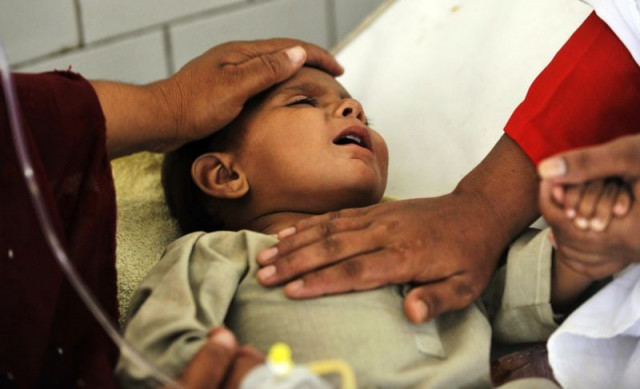LAHORE:
The city is witnessing a concerning rise in waterborne diseases, particularly diarrhoea and typhoid, since the onset of monsoon season, due to contaminated sources, stagnant pools of dirty water, and increased bacterial activity.
Health officials and medical experts have warned that the situation may aggravate without urgent public health intervention and individual precautions.
According to sources, over the past 24 hours, more than 1,200 cases of diarrhoea and typhoid have been reported from five major government hospitals in the city, signaling an alarming uptick in infections typically associated with poor sanitation and unhygienic food and water consumption during the monsoon period.
Medical experts emphasise that the spread of diarrhoea during monsoon is not unusual, as contaminated water and unhygienic food become key channels for bacterial and viral infections.
“The stagnant rainwater accumulated in open areas becomes a breeding ground for flies and mosquitoes, which act as carriers of germs, facilitating the spread of diseases like diarrhoea, typhoid, and even dengue,” said Dr Asma Tariq, an infectious diseases specialist at Mayo Hospital.
She added that improper drainage systems, overflowing sewage, and lack of clean drinking water amplify the public health risks during the season. “When clean and dirty water mix, it becomes a health hazard, especially in urban slums and low-income neighboorhoods,” she noted.
Health authorities are urging citizens to adhere to basic hygiene practices to curb the spread of gastrointestinal infections. Washing hands with soap before and after meals, and after using toilet is considered one of the simplest yet most effective ways to prevent diarrhoea.
“Many cases we are seeing are linked to people consuming food from unhygienic roadside stalls or drinking unfiltered water. It is crucial to ensure that food is cooked in clean environments and water is either boiled or filtered before consumption,” said Dr Farhan, a Medical Officer at Services Hospital.
He stressed that even handling food with unwashed hands or eating from unsanitary establishments could expose individuals to bacterial infections. “What we eat, how it’s cooked, and how we handle it in these months can determine whether we stay healthy or fall ill,” he added.
The city’s healthcare system is already feeling the strain with rising patient influx. Hospitals have reported a shortage of staff to manage the diarrhoea and typhoid cases, while laboratories are overburdened with diagnostic testing. The situation is further aggravated in peripheral areas where access to quality healthcare is limited.
“We are witnessing a seasonal surge, but what’s worrying is that public awareness about preventive measures is still very low,” commented Dr Rabia Noor, a public health officer. She called for urgent municipal action to address sewage overflow, ensure water quality checks, and initiate awareness campaigns targeting vulnerable communities.
Apart from water contamination, the monsoon also brings an increase in mosquito and fly populations, which act as vectors, carrying germs from sewage to food and water supplies. “It is vital to cover all food items, especially in markets, and ensure that waste is disposed of properly to reduce fly breeding,” said environmental health expert Dr Shahid Mehmood.
He warned that without proper waste management and fumigation drives, these insects could further spread diseases, not just diarrhoea but also typhoid, hepatitis and dengue.
The municipal authorities claim to be initiating emergency cleanliness drives in affected areas, along with water chlorination measures.
